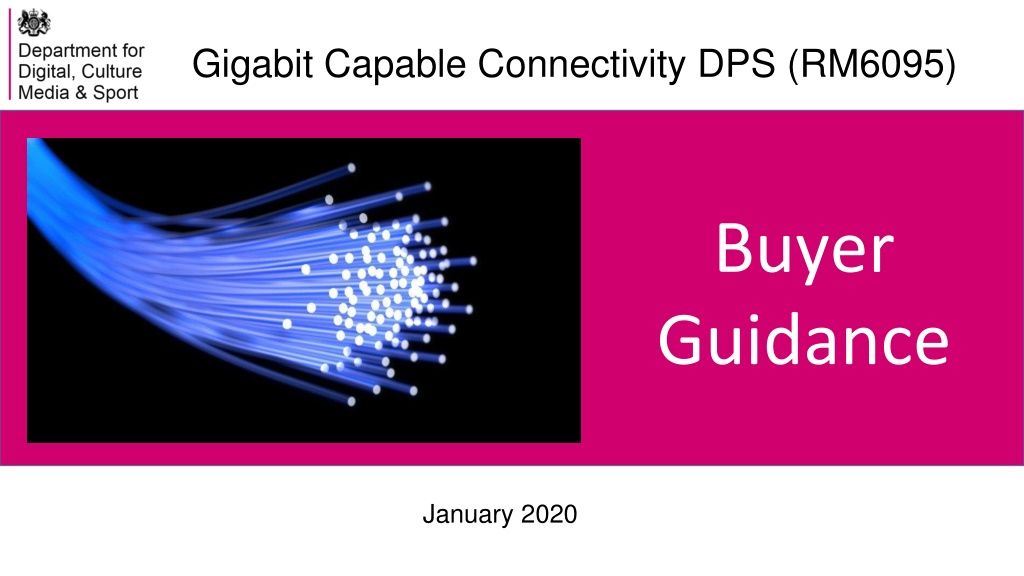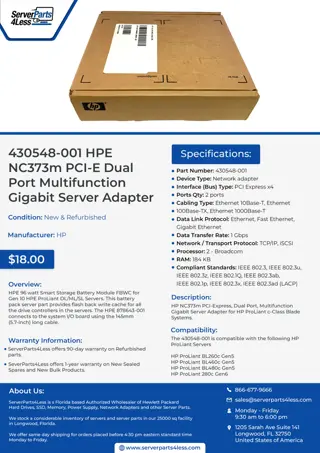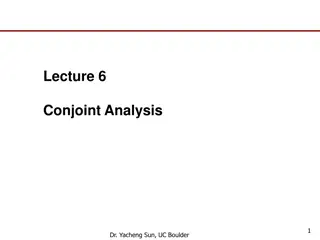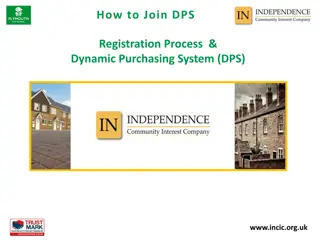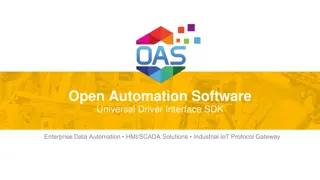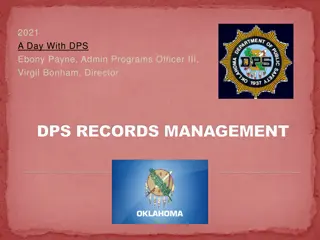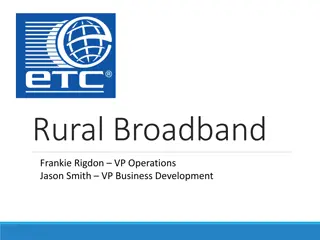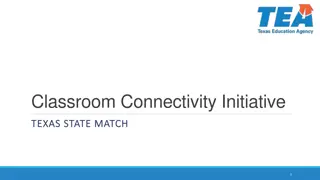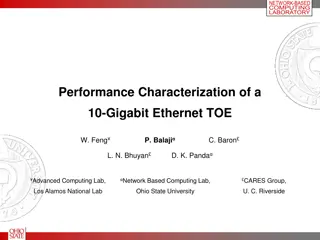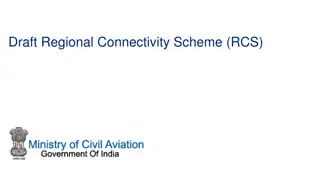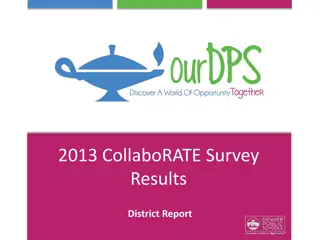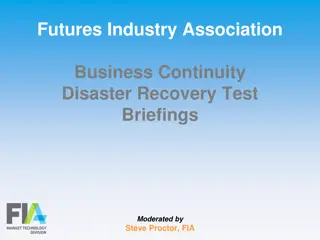Understanding Gigabit Capable Connectivity DPS (RM6095) Buyer Guidance January 2020
This document provides detailed guidance for Buyers on procuring connectivity services through the Gigabit Capable Connectivity DPS (RM6095). It explains the Dynamic Purchasing System, service types available, contract structure, and the Buyer process. The DPS functions like an online framework where pre-approved suppliers offer their services. Three service types can be procured: Managed Broadband Services, Infrastructure Build Services, and Managed Infrastructure Services. Buyers must run mini-competitions to select a preferred supplier from the shortlisted ones. Additional details and documentation can be accessed through the provided link.
Download Presentation

Please find below an Image/Link to download the presentation.
The content on the website is provided AS IS for your information and personal use only. It may not be sold, licensed, or shared on other websites without obtaining consent from the author. Download presentation by click this link. If you encounter any issues during the download, it is possible that the publisher has removed the file from their server.
E N D
Presentation Transcript
Gigabit Capable Connectivity DPS (RM6095) Buyer Guidance January 2020
Disclaimer This slide pack has been produced by BDUK to help local bodies that might be wishing to make use of the Dynamic Purchasing System (RM6095) set up by Crown Commercial Services. Whilst the slide pack is intended for local bodies that are making use of DCMS funding (such as that provided by LFFN or RGC for example), the procurement route is in no way linked to or limited by the sources of funding. In deciding to use the DPS as a route to market, regardless of funding source, local bodies should seek there own legal and procurement advice to ensure that the DPS and associated documentation is appropriate for their needs.
Document purpose This slide pack describes the process that a Buyer needs to follow when procuring connectivity services using the Gigabit Capable Connectivity Services DPS (RM6095). It includes: An overview of the Dynamic Purchasing System (DPS) A description of the service types that can be procured The contract structure The Buyer process Embedded template documentation It should be used in conjunction with the wider guidance for RGC and LFFN produced by BDUK.
What is a Dynamic purchasing System (DPS)? The DPS is like a framework but is administered online and suppliers can come and go over the term, initially set to four years. The contract is already set up for Buyers. It is based on the latest version of the Public Sector Contract. The DPS provides a shortlist of eligible suppliers using a simple filtering process. These suppliers have already signed up to the contract terms and completed the standard supplier questionnaire. Once the Buyer has prepared a shortlist using the DPS, they must run a mini competition to select the preferred supplier from the shortlist.
The services Further details and documentation can be accessed here: https://www.crowncommercial.gov.uk/agreements/RM6095
Understanding the services There are three service types that can be procured through the DPS: Managed broadband services: Internet provision to a specific site or sites. This may include service levels to create a business class internet connection with a commitment to fault resolution and fix times. Infrastructure build services: Provision and subsequent maintenance by the supplier of any telecommunication infrastructure and associated commercial activities that might be required to provide a given site or sites with access to a wider market guaranteeing the on-going availability of at least one reseller of Gigabit Capable Connectivity Services. Managed broadband services: Direct access to telecommunications infrastructure between two specific locations. Managed in this context relates to the provision and subsequent maintenance of any telecommunication infrastructure along with guaranteeing a Right of Use for the Buyer to access the infrastructure. This Service Type does not include any aspects of managed network services other than access to the infrastructure.
The contract Further details and documentation can be accessed here: https://www.crowncommercial.gov.uk/agreements/RM6095
Understanding the contract structure The contract is arranged in three parts: The DPS Agreement: This sits between the Supplier and CCS: - Terms and conditions - Appointment form Joint Schedules Joint schedules: Used by CCS and also the Buyer when ordering: - Joint Schedules The Order Contract: This sits between a Supplier and a Buyer: - - Terms and conditions - Order Schedules
Overview of the contract structure DPS Authority The DPS Agreement: Core terms Appointment form 9 DPS Schedules 12 Joint schedules Guidance and support The Supplier The Buyer The Order Contracts: Core terms 12 Joint schedules (7 mandatory) 23 Order schedules (10 mandatory)
Using the contract The contract consists of: The form the supplier completed to get on to the DPS (incorporating the standard Cabinet Office standard questionnaire); The terms and conditions (the Core terms); 43 schedules; The good news is that: 1. Only 14 schedules are used in the order contract (unless the Buyer wishes to use more) 2. Many of these schedules are extremely short (less than 1 page) This means that the resulting contract is short and well structured. Also, it has already been accepted by all of the suppliers so there is no requirement for negotiation.
The DPS Schedules The DPS Appointment form includes the supplier responses to the standard supplier questionnaire (SQ) The DPS schedules include: 1. Specification 2. DPS Application 3. DPS Pricing 4. DPS Management 5. Management Levy and Information 6. Order form template and Order Schedules 7. Order Procedure 8. Self Audit Certificate 9. Cyber essentials scheme
Schedules to use for service type 1 Order Schedules In addition to the DPS schedules, the specific Joint Schedules and Order schedules that the Buyer will need to incorporate into the contract include: 1 Transparency Reports 2 Staff Transfer 3 Continuous Improvement 4 Order Tender 5 Pricing Details 6 ICT Services 7 Key Supplier Staff 8 Business Continuity and Disaster Recovery 9 Security 10. Exit Management 11. Installation Works 12. Clustering 13. Implementation Plan and Testing 14. Service Levels 15. Order Contract Management 16. Benchmarking 17. MOD Terms 18. Background Checks 19. Scottish Law 20. Order Specification 21. Northern Ireland Law 22. DCMS Management Information Joint Schedules Core Terms 1 Definitions 2 Variation Form 3 Insurance Requirements 4 Commercially Sensitive Information 5 Corporate Social Responsibility 6 Key Subcontractors 7 Financial Difficulties 8 Guarantee *enable at Call-Off only 9 Minimum Standards of Reliability 10 Rectification Plan 11 Processing Data 12 Supply Chain Visibility Mandated schedules Optional schedules
Schedules to use for service type 2 Order Schedules In addition to the DPS schedules, the specific Joint Schedules and Order schedules that the Buyer will need to incorporate into the contract include: 1 Transparency Reports 2 Staff Transfer 3 Continuous Improvement 4 Order Tender 5 Pricing Details 6 ICT Services 7 Key Supplier Staff 8 Business Continuity and Disaster Recovery 9 Security 10. Exit Management 11. Installation Works 12. Clustering 13. Implementation Plan and Testing 14. Service Levels 15. Order Contract Management 16. Benchmarking 17. MOD Terms 18. Background Checks 19. Scottish Law 20. Order Specification 21. Northern Ireland Law 22. DCMS Management Information Joint Schedules Core Terms 1 Definitions 2 Variation Form 3 Insurance Requirements 4 Commercially Sensitive Information 5 Corporate Social Responsibility 6 Key Subcontractors 7 Financial Difficulties 8 Guarantee *enable at Call-Off only 9 Minimum Standards of Reliability 10 Rectification Plan 11 Processing Data 12 Supply Chain Visibility Mandated schedules Optional schedules
Schedules to use for service type 3 Order Schedules In addition to the DPS schedules, the specific Joint Schedules and Order schedules that the Buyer will need to incorporate into the contract include: 1 Transparency Reports 2 Staff Transfer 3 Continuous Improvement 4 Order Tender 5 Pricing Details 6 ICT Services 7 Key Supplier Staff 8 Business Continuity and Disaster Recovery 9 Security 10. Exit Management 11. Installation Works 12. Clustering 13. Implementation Plan and Testing 14. Service Levels 15. Order Contract Management 16. Benchmarking 17. MOD Terms 18. Background Checks 19. Scottish Law 20. Order Specification 21. Northern Ireland Law 22. DCMS Management Information Joint Schedules Core Terms 1 Definitions 2 Variation Form 3 Insurance Requirements 4 Commercially Sensitive Information 5 Corporate Social Responsibility 6 Key Subcontractors 7 Financial Difficulties 8 Guarantee *enable at Call-Off only 9 Minimum Standards of Reliability 10 Rectification Plan 11 Processing Data 12 Supply Chain Visibility Mandated schedules Optional schedules
The ordering process for the Buyer 3 1 2 Run a mini competition using a local portal Use the DPS to create a supplier shortlist Set filters for the DPS
Setting the DPS filters 3 1 2 Run mini competition using local portal Set high level requirements and DPS filters Use DPS to create supplier shortlist Decide which service type you are buying: Broadband connectivity services Infrastructure build service Managed infrastructure service Create a site list using the site list template v1-0*. Use the tabs that correspond to the service type you are wanting to buy. Only one service type can be bought in a single order. Decide if any additional compliance is required for any of the sites: PSN accreditation HSCN services Cyber security * Where DCMS funding is being used, the site list will require assurance to confirm eligibility for funding and a no state aid risk assessment.
Use the DPS to create a supplier shortlist 3 1 2 Run mini competition using local portal Set high level requirements and DPS filters Use DPS to create supplier shortlist 1. Go to https://www.crowncommercial.gov.uk/agreements/RM6095 2. Select Register as a Buyer under How to Buy 3. Enter your filtering criteria from step 1 4. Download a list of eligible suppliers Notes: 1. This process can be run as often as required 2. Suppliers have already been pre-qualified: Accepted the terms and conditions Completed the standard supplier questionnaire A full list of active suppliers can be seen here: https://supplierregistration.cabinetoffice.gov.uk/dps-suppliers/gcc
3 1 2 Run mini competition using local portal Set high level requirements and DPS filters Use DPS to create supplier shortlist Running a mini competition
Overview of the mini competition 3 1 2 Run mini competition using local portal Set high level requirements and DPS filters Use DPS to create supplier shortlist 1. Where the DPS shortlist identifies more than one eligible supplier, the Buyer must run a mini-competition to identify the preferred supplier. 2. The process for this mini competition is set out in DPS Schedule 7 Order Procedure. Buyers should download this document and familiarise themselves with the process. 3. The Buyer can either use a local procurement portal or make use of the CCS procurement portal when running the mini competition. 4. The mini competition is based on the Buyer requirements. Further details and documentation can be accessed here: https://www.crowncommercial.gov.uk/agreements/RM6095
The buyer requirements 3 1 2 Run mini competition using local portal Set high level requirements and DPS filters Use DPS to create supplier shortlist Use standard templates to create the Buyer requirements: Instructions to bidders, including the approach to evaluation The completed contract The order form The template that suppliers should use when preparing pricing The site list The service requirements
The buyer requirements 3 1 2 Run mini competition using local portal Set high level requirements and DPS filters Use DPS to create supplier shortlist Buyers can either create their own ITT documentation or use the template provided. Instructions to bidders Buyers should take note not to include requirements in the ITT document. All requirements should either already be included in the contract or have boiler plate text to be accepted or amended by the Buyer. DPS Schedule 7 Order Procedure: This includes a template evaluation matrix. Buyers should set the weightings in this template and use it in the instructions to bidders.
The buyer requirements 3 1 2 Run mini competition using local portal Set high level requirements and DPS filters Use DPS to create supplier shortlist DPS Schedule 6 contains the template order form that the Buyer should use when placing an order. It is the key document that ties all of the contract schedules together and summarises all aspects of the order. The order form The Buyer should work through this document to consider all of the text highlighted in yellow. This text should either be: - Deleted if not required. This will be for two of the three service types as a minimum and for all the optional schedules not used - Completed and highlighting removed if it is to be retained
The buyer requirements 3 1 2 Run mini competition using local portal Set high level requirements and DPS filters Use DPS to create supplier shortlist The Order Form from the previous step, once completed, will identify all of the schedules that are to be used and these will form the completed contract. The completed contract The Buyer should read all of the schedules that are to be used to confirm that they are appropriate. In doing so, the Buyer should consider all of the text highlighted in yellow. This text should be: - Deleted if not required - Completed and highlighting removed if it is to be retained - Left in if needed for live operation of the contract
The buyer requirements 3 1 2 Run mini competition using local portal Set high level requirements and DPS filters Use DPS to create supplier shortlist The site list Use the site list template provided. See additional notes on the first tab in the spreadsheet to aid completion.
The buyer requirements 3 1 2 Run mini competition using local portal Set high level requirements and DPS filters Use DPS to create supplier shortlist If the Buyer has any additional requirements these need to be captured in the Service Requirement. The service requirements In most cases, a combination of the order form, the site list and the ITT document should be sufficient to capture the service requirements. Where any additional requirements result in additional contractual terms these need to be included in the Order Form under the heading Order Special Terms.
The buyer requirements 3 1 2 Run mini competition using local portal Set high level requirements and DPS filters Use DPS to create supplier shortlist The template that suppliers should use when preparing pricing A pricing template can be found in Order Schedule 5 Pricing details. It is also included in the template ITT document.
Customising the contract 3 1 2 Run mini competition using local portal Set high level requirements and DPS filters Use DPS to create supplier shortlist Joint Schedules: Joint schedule 1 (Definitions) No amendments needed; Joint schedule 2 (Variation form) No amendments needed. To be used when contract is live. Joint schedule 3 (Insurance requirements) - No amendments needed. Joint schedule 4 (Commercially sensitive information) - No amendments needed. This is for the supplier to complete as part of the bid response. Joint schedule 5 (Corporate Social Responsibility) - No amendments needed; Joint schedule 6 (Key subcontractors) - No amendments needed. Optional schedule; Joint schedule 7 (Financial difficulties) - No amendments needed. Optional schedule; Joint schedule 8 (Guarantee) - No amendments needed. Optional schedule; Joint schedule 9 (Minimum Standards of Reliability) - No amendments needed. Optional schedule; Joint schedule 10 (Rectification Plan) - No amendments needed. Used in life. Joint schedule 11 (Processing Data) May need some details completing in Annex 1 to identify data controller and to define any personal data being held by the supplier under the contract. Joint schedule 12 (Supply chain visibility) - No amendments needed. Optional schedule;
Customising the contract 3 1 2 Run mini competition using local portal Set high level requirements and DPS filters Use DPS to create supplier shortlist Order Schedules: Order schedule 1 (Transparency reports) Order schedule 2 (Staff Transfers) Order schedule 3 (Continuous improvements) Order schedule 4 (Order Tender) Order schedule 5 (Pricing Details) Order schedule 6 (ICT Services) Order schedule 7 ( Key supplier staff) Order schedule 8 (Business continuity and disaster recovery) Order schedule 9 (Security) Order schedule 10 (Exit Management) Order schedule 11 (Installation works) Order schedule 12 (Clustering) cont
Customising the contract 3 1 2 Run mini competition using local portal Set high level requirements and DPS filters Use DPS to create supplier shortlist Order Schedules (cont): Order schedule 13 (Implementation plan and testing) Order schedule 14 (Service Levels) Order schedule 15 (Order contract management) Order schedule 16 (Benchmarking) Order schedule 17 (MOD Terms) Order schedule 18 (Background checks) Order schedule 19 (Scottish Law) Order schedule 20 (Specification) Order schedule 21 (Northern Ireland Law) Order schedule 22 (DCMS Management Information)
